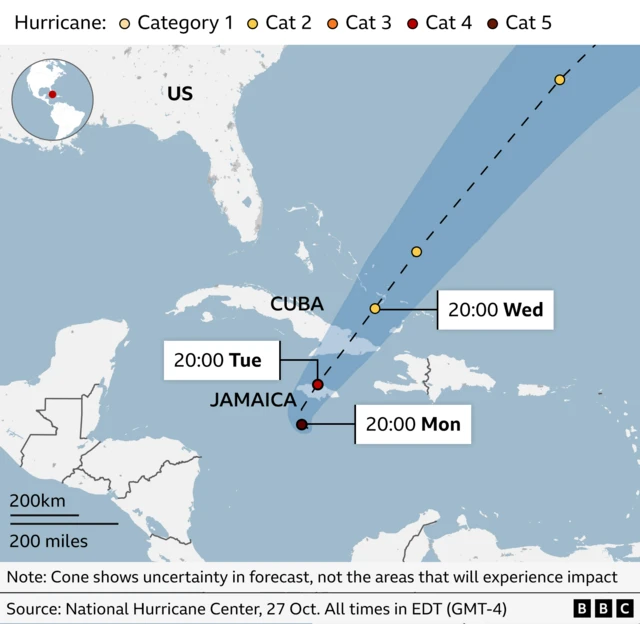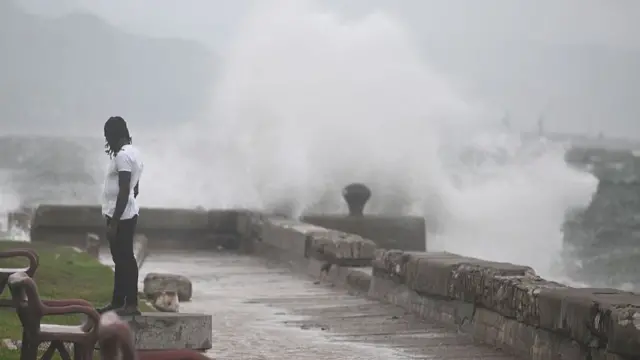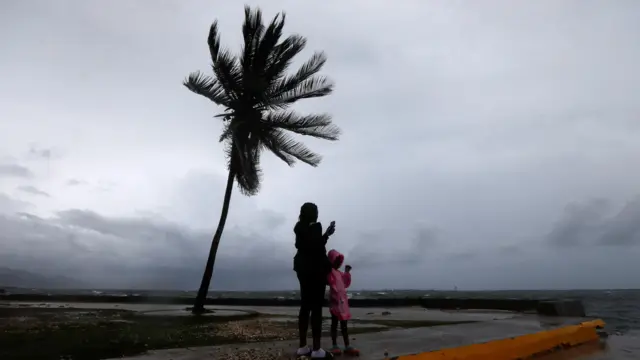Summary
The world's most powerful storm this year is drawing closer to Jamaica as it barrels northeast through the Caribbean Sea
The storm has already been blamed for three deaths in Jamaica, and four deaths in Haiti and the Dominican Republic
Forecasters believe it could become the strongest hurricane ever to hit Jamaica, with winds of 175mph ( 290km/h) and as much as 101cm (40 inches) of rain
Melissa was upgraded to a category five - the maximum strength - by the US-based National Hurricane Center early on Monday
Warnings are also in place for Cuba and the south-eastern Bahamas
Waiting for Hurricane Melissa as my home becomes the story
Nick Davis
Reporting from JamaicaA few days ago I joked with a former colleague that I was regretting my choice of living in an old Edwardian house here in Kingston, Jamaica.
The building was converted into flats decades ago and its old bones have seen their fair share of storms - but probably not one like this.
Outside my window is a century palm, a majestic 50-year-old tree taller than my building. My hope is that in the next few days it'll still be here.
Someone I follow on Instagram shared that he was driving around to take mental snapshots of the city, because the capital likely won't look the same for a while after this storm.
The BBC has journalists all over the world, but often they're "parachuted in" to gather the snippets and factoids to then transform into the record of events. Journalists say we should never "be the story", but this time my life and my family and friends are the top line, because Hurricane Melissa is a threat to our lives here.
I'd like to dedicate this first live page dispatch to my cousin Andrew, who works for the power company, away from his girls, to make sure the infrastructure we need is in place when we need it.
'Nobody in Jamaica has lived through anything comparable'
Meteorologist and storm chaser Matthew Cappucci tells the BBC that Melissa, a category five hurricane, will be the strongest to hit Jamaica since records began.
There was one hurricane, Gilbert, in 1981 that killed 49 people in Jamaica, and it was a category three when it made landfall, he says.
Melissa "could be an order of magnitude more significant", because hurricane strength doesn't go up linearly - it goes up exponentially.
"Nobody in Jamaica has lived through anything comparable to what they're going to get," Cappucci says.
He adds that while category five storms do occur, they tend not to reach land.
"It is extremely rare to get a category five with impact anywhere on Earth."
Mandatory evacuation in effect as Jamaica closes schools, airports
Jamaica’s prime minister, Andrew Holness, has ordered a mandatory evacuation of low lying areas as the island prepares for Hurricane Melissa to make landfall.
Shelter orders are also in place in the country, and all public schools have been moved online.
The two international airports, Norman Manley International Airport in Kingston and Sangster International Airport in Montego Bay, have also shuttered, suspending all operations over the weekend.
Catastrophic and life-threatening flooding forecast
AFP via Getty ImagesA man watches waves crash at the Kingston Waterfront as Hurricane Melissa approaches on 27 October
Hurricane Melissa will bring "catastrophic and life-threatening flash flooding" to Jamaica, says the National Hurricane Center.
The US-based group expects between 15 and 30 inches of rainfall to hit Jamaica, with extensive rain in Cuba and the south-eastern Bahamas, bringing "numerous landslides".
As the hurricane hits Jamaica, destructive winds of up to 130 mph (209 km/h) are expected to cause power cuts and isolate communities.
Storm surges of up to 13 feet above ground level are also likely with smaller surges in south-east Cuba.
It's a similar story in Haiti, Dominican Republic and south-eastern Bahamas, with the hurricane centre warning of life-threatening flash flooding and landslides.
A storm 'the likes of which we have never seen'
The Jamaican government has done everything it can to prepare for a storm "the likes of which we have never seen", the country's Information Minister, Dana Morris Dixon, told Shaun Ley on BBC's Newshour.
With up to 40 inches of rain possible in parts of the island nation, Dixon says those are "numbers we've never seen in Jamaica in terms of rainfall".
And on top of that, Dixon added, October is already the country's rainy month.
"The ground is already very saturated. And then to take that much rain means we're going to have flooding, extensive flooding and landslides in the mountainous areas."
She said the last hurricane to directly hit Jamaica was 37 years ago, and urged people to take this one seriously.
Jamaica has 881 active shelters, and all of them are free, she added.
The world's strongest storm this year bears down on Jamaica
ReutersJamaica is bracing for the world's strongest storm this year - and possibly the strongest on record for the island nation - as US meteorologists warn of "catastrophic and life-threatening" conditions.
Hurricane Melissa, which is expected to make landfall early on Tuesday, has already been blamed for three "storm-related deaths" on the Caribbean island, as well as four deaths in Haiti and the Dominican Republic.
With wind speeds of up to 175mph (282km/h), Melissa is a category five storm - the maximum strength. And it's intensifying.
Experts warn the hurricane's slow pace may mean prolonged torrential rain in some areas, increasing the risk of deadly flooding and landslides.
Stay with us as we bring you live updates.















0 Comments